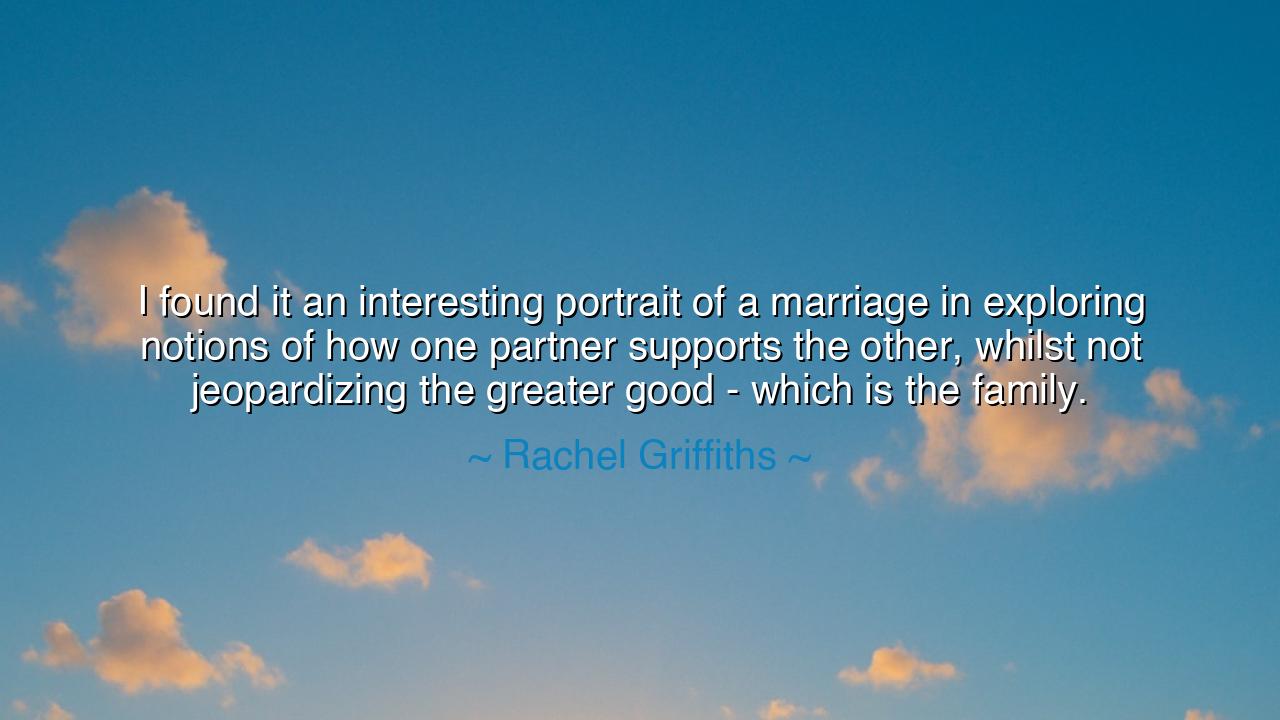
I found it an interesting portrait of a marriage in exploring
I found it an interesting portrait of a marriage in exploring notions of how one partner supports the other, whilst not jeopardizing the greater good - which is the family.






In the intricate weave of human relationships, few bonds are as complex and profound as that of marriage. The words of Rachel Griffiths—"I found it an interesting portrait of a marriage in exploring notions of how one partner supports the other, whilst not jeopardizing the greater good—which is the family"—offer a profound insight into the delicate balance between individual sacrifice and collective responsibility. Marriage, as Griffiths so eloquently points out, is not merely a relationship between two people but a partnership that must navigate the tension between personal needs and the greater good of the family unit. In this union, support and sacrifice are not opposites but complementary forces that shape the lives of those involved.
In the ancient world, the union of two individuals in marriage was often seen not just as a personal bond, but as the bedrock of society itself. Homer’s Iliad and Odyssey paint vivid pictures of how marriage often served the larger goal of family and community. The relationship between Odysseus and Penelope, for example, was not simply about romantic love; it was about mutual support in the face of trials that reached beyond personal hardship. While Odysseus went to war, Penelope remained steadfast at home, raising their son and keeping their household intact. This balance of individual sacrifice for the good of the family was the bedrock of their marriage. Penelope supported Odysseus by waiting for his return, while he, in turn, fought for the family’s honor and survival.
Similarly, Aristotle in his writings on ethics suggested that the family is the foundational unit of society, where individuals must find their harmony between personal virtue and the greater good. Aristotle believed that the role of the spouse was to support one another’s growth and well-being, yet always with a view toward the common good of the family and the community. He emphasized that marriage must not only fulfill the needs of the individuals involved, but it must also serve the greater moral order of society. The careful balance of personal desires and collective responsibility that Griffiths speaks of is reflected in this ancient understanding of marriage—where the individual partner’s success should never come at the expense of the family’s welfare.
Consider the example of Abigail Adams and John Adams, whose partnership during the American Revolution serves as a testament to the delicate balance between personal support and the larger good. While John Adams was deeply involved in shaping the future of a nation, Abigail provided unwavering emotional and intellectual support, balancing her own desires with the greater good of the family and the country. Abigail’s letters to her husband, filled with wisdom and encouragement, reflect her understanding of sacrifice and support. Her love for her husband was not just a private emotion but a shared commitment to the good of the family and the ideals they both cherished. She knew that their family’s success depended on more than personal happiness—it was about fulfilling their larger duty to their community, their country, and their shared legacy.
Griffiths’ reflection on marriage emphasizes a theme that runs through many great narratives: the ability to support one another without losing sight of the greater good. In the world of marriage, this is a dance of mutual sacrifice, where each partner helps the other grow, but without forsaking their shared responsibility. The story of Antony and Cleopatra offers a more tragic yet poignant example of this tension. Their union, though filled with love and passion, was ultimately compromised by their individual desires for power and dominance. The larger good of the Roman Empire and the legacy of their people was sacrificed for personal ambition, leading to their downfall. The story of Antony and Cleopatra serves as a cautionary tale of how, in a marriage, the failure to balance personal desire with the greater good can bring ruin, not just to the couple, but to the family and society itself.
From Griffiths’ words, we learn that the strength of a marriage is not merely in the love between the two individuals but in the ability to support one another while also protecting the collective well-being. The family must always come first, and in this delicate balance lies the foundation of a strong partnership. Like Penelope and Odysseus, like Abigail and John Adams, a successful marriage requires an ongoing commitment to shared responsibility, where each partner supports the other’s growth, while never losing sight of the ultimate goal: the well-being of the family.
The lesson here is clear: the greatest marriages are those that can balance personal needs with the needs of the family. Support, sacrifice, and a shared sense of purpose are the pillars upon which any lasting union is built. In your own life, consider how you can cultivate this balance between selflessness and shared responsibility. Whether in your marriage, friendships, or family, strive to support others without compromising the greater good. Just as the heroes and leaders of the past understood, a society, a family, or a relationship can only thrive when each individual’s growth is aligned with the common good—the greater purpose that binds them together.






AAdministratorAdministrator
Welcome, honored guests. Please leave a comment, we will respond soon